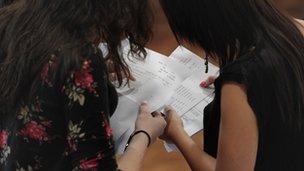Small dip in teenage dropout rate hailed
- Published

This year's GCSE students have to stay on education and training until they are 17.
There has been a slight dip in the proportion of teenagers not in education, employment or training (Neet) in England.
Statistics for the second quarter of this year, April to June, show the proportion of 16- to 18-year-olds who were Neet was 9.1% - 168,000 in total.
This is a drop of 1.4 percentage points - 28,000 - on the same period in 2012.
The government hailed the rate for the second quarter of the year as the lowest for more than 10 years.
The Department for Education stressed there had been five consecutive quarters where the 16-24 age group rate was lower than it had been the year before.
'Global race'
Skills Minister Matthew Hancock said: "With GCSE results out today, I am heartened to see the fall in the number of young people not in work, training or education.
"We are heading in the right direction, but one young person out of work, education or training, is one too many.
"That is why we are continuing to work hard to give young people the skills, confidence and experience demanded by employers and universities.
"Only then can we say we have done everything we can to ensure young people reach their potential and help us compete in the global race."
Analysis of the figures suggested the decrease was driven by two factors:
an increase in those in education and training - up from 80.9% to 83% year on year
an increase, by 1.4 percentage points, in the proportion of those who were not in education or training finding jobs
The figures come out as 16-year-olds are receiving their GCSE results. This group of teenagers will be the first to have to stay on in education or training after their 16th birthday.
Under the new rules, young people will be required to continue their education to the end of the academic year in which they turn 17. From summer 2015, this will rise to staying in education until their 18th birthday.
- Published16 July 2013
- Published28 February 2013